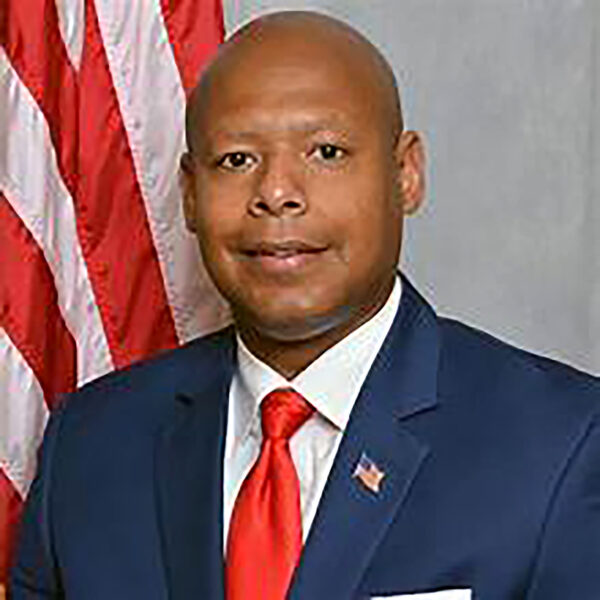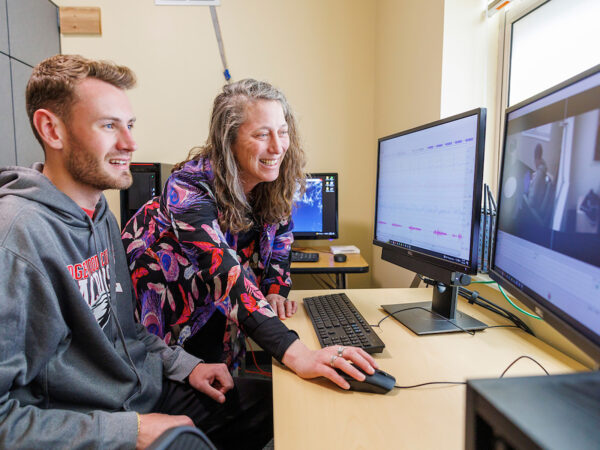Bachelor of Science in Criminal JusticeSchool of Arts and Sciences
Advocate. Protect. Serve.
If you’re driven by a passion for justice and aspire to a career in public service and safety, a Bachelor of Science in Criminal Justice degree will equip you to tackle the technical, psychological, and ethical complexities of this dynamic field. Established in the 1970s, Edgewood College’s criminal justice major aims to cultivate ethical leaders committed to social justice, crime prevention, and the protection of human rights. Our emphasis on ethical principles and sociological perspectives distinguishes this program, setting it apart from conventional programs.
Embarking on a degree in criminal justice unlocks a multitude of career paths encompassing law enforcement, corrections, legal professions, victim advocacy, forensic science, homeland security, and social services. Our curriculum is tailored to empower students seeking to leverage their professional roles for societal good, championing justice, public safety, compassionate service, and advocating for the rights of victims and vulnerable populations.
Students in this program can sit for the state certification social work licensing exam when they add the human services concentration. When paired with the criminal justice major, this concentration prepares students to pursue state certification. Upon program completion and passing the state social work exam, students will obtain the state credential of “Certified Social Worker” without having to continue to graduate school.
Madison, WI
On-campus
120
August 25, 2025
Careers within Criminal Justice
$74,910
Average annual salary for a Police Officer or Detective
A bachelor’s degree in Criminal Justice prepares you for a variety of career paths. Those marked with an asterisk (*) require a graduate level degree.
- Attorney*
- Crime Victim or Witness Advocate
- Federal Law Enforcement/FBI Agent
- Legal Assistant / Paralegal
- Parole Agent
- Police Officer
- Private Investigator
- Security Manager
- Social Worker
- TSA Agent
Criminal Justice by the Numbers
95%
students complete a Criminal Justice Field Internship
100%
students complete an original research project
Criminal Justice Student Spotlight

Miguel Konde Gwo ’24
Bachelor of Science in Criminal Justice
“Studying criminal justice at Edgewood College has been a dynamic, engaging, and fun experience for me. Through a combination of hands-on learning opportunities, rigorous coursework, and expert faculty guidance, I have gained a solid comprehension of the criminal justice system. The program prepares students for different career paths, whether aspiring to pursue law like me, delve into law enforcement, or seeking a civilian role within the criminal justice system. Faculty members are incredibly supportive, accessible, and well-connected within the criminal justice community.”
Featured Courses
Criminal Justice 236 Kids and Crime: Juvenile Justice
An introduction to the issues, including an examination of definitions of childhood; the rules that define delinquency; historical and contemporary reactions to delinquent behavior; diverse and conflicting models of delinquency causation; and an overview of the changing systems of juvenile justice.
Criminal Justice 342 The Death Penalty Debate
A historical study of capital punishment in the United States from the 1600s to the present. A close examination of the five methods of execution. An overview of wrongful deaths and high profile capital cases. Revisit issues on: Execution of youth for heinous crimes; submission of DNA evidence in capital cases; and the U.S. Constitution’s VIII Amendment as it relates to what constitutes “Cruel and Unusual Punishment.” A critical analysis of arguments in favor of and in opposition to capital punishment.
Criminal Justice 355 Introduction to Criminal Law
Criminal law to obtain a basic understanding of the criminal process and its underlying purposes and legal principles, and the fundamentals of legal analysis. The course will include the study of several areas of current concern in criminal justice.
Student Organizations
Criminal Justice Association
The Criminal Justice Association (CJA) aims to hold regular meetings to explore diverse topics relating to the field of criminal justice. Every semester, CJA invites speakers to share their insights and experiences in the realm of criminal justice. Their goal is to feature individuals representing various aspects of the field, enabling members to gain valuable insights, and engage in dialogue with them. Serving as a platform for individuals intrigued by this professional trajectory, the Criminal Justice Association strives to facilitate the expansion of knowledge across multifaceted aspects of the field. Additionally, it serves as a forum for establishing connections and fostering relationships with professionals actively engaged in the industry.
Criminal Justice Experiences
Our Commitment to Social Impact
Students intern and volunteer in the community with organizations such as the Catholic Multicultural Center, Domestic Abuse Intervention Services, the Dane County Sheriff’s Department, Journey Mental Health Center, and the Salvation Army. The internship requirement is coupled with the Ethics in Criminal Justice course, which helps students make important connections between the ethical conundrums they read about, and the real-life scenarios encountered in the field of criminal justice professions on a daily basis. The internships also foster valuable and enduring social connections, which can enhance job placement opportunities upon completion of the degree.
Bridging Theory with Practical Application: The Senior Seminar Project
The senior seminar within our criminal justice program represents the pinnacle of your academic journey, blending the knowledge, skills, and theoretical concepts acquired throughout your studies. This culminating experience not only prepares you for a seamless transition into successful careers in the field but also fosters the development of crucial communication, presentation, project management, research, and professional skills vital for success. While students take ownership of their individual projects, the senior seminar encourages collaboration among peers and critical examination of the implications and interconnectedness of their studies.
Criminal Justice Faculty Spotlights

Carolyn Field, PhD
Professor, Director of Criminal Justice Program
CField@edgewood.edu

Shon Barnes
Adjunct Instructor
SBarnes@edgewood.edu

Mary Ellen Karst
Adjunct Instructor
MKarst@edgewood.edu

Annie Jay
Adjunct Instructor
Ajay@edgewood.edu

Cassandra Thompson
Adjunct Instructor
CassandraThompson@edgewood.edu

Steven Davis, PhD
Professor of Political Science
davis@edgewood.edu

Megan Beckler
Adjunct Instructor
MBeckler@edgewood.edu

Patricia Egan, MSW, Ph.D.
Senior Lecturer, Coordinator of the Human Services Program
PEgan@edgewood.edu

Kumar Guha
Adjunct Instructor
KGuha@edgewood.edu

Amitabh Pal
Adjunct Instructor
apal@edgewood.edu

Jessica Gillette
Adjunct Instructor
JGillette@edgewood.edu

Dan Kigeya
Adjunct Instructor
DKigeya@edgewood.edu

Michelle Turner
Lecturer, Coordinator of Health and Society Minor
MicTurner@edgewood.edu
Experiential Learning Opportunities
Students majoring in criminal justice benefit from a variety of experiential learning, including tours of organic farms, social service agencies, prisons, jails, community food programs, and housing shelters for teens. Community engagement through partnerships, project collaboration, and faculty initiatives in the diversity of Madison’s community involves students directly in experiencing and shaping the social culture in the state of Wisconsin. Aligned with the core values at Edgewood College, students will have ample opportunities to socialize and engage with the community on campus and beyond.
Related Programs
-

On-campus
Bachelor of Science in Political Science -

On-campus
Bachelor of Science in Psychology -

On-campus
Bachelor of Science in Sociology
Frequently Asked Questions
Are there opportunities for networking or connecting with professionals in the field?
Yes, the Ethics in Action: Criminal Justice course connects students to internships in the local community. Students may also complete an Internship outside of the region or remotely if interested in a placement elsewhere.
Where have Edgewood College criminal justice alumni built successful careers?
Many graduates of this program are currently law enforcement officers at Madison Police Department and the Dane County Sheriff’s Office. Some have gone into careers with the Department of Corrections, the Office of Workforce Development, or other social service related agencies. Several recent graduates have attended graduate school at the John Jay College of Criminal Justice and the University of Wisconsin. Many are interested in practicing criminal law and have gone on to law school.
What minors does Edgewood College offer that would coordinate with a Criminal Justice major?
Edgewood College offers various minors that complement the criminal justice major, including Sociology, Health and Society, Psychology and Women’s and Gender Studies.
Is this program transfer-friendly?
Yes, our Criminal Justice program readily accepts transfer credits for Criminal Justice, Criminology and Sociology coursework.
Does Edgewood College have an articulation agreement with Madison College?
Yes, Edgewood College has a transfer agreement with Madison College, and it was just recently updated. Students who receive an Associate Degree in Criminal Justice Studies from Madison College will be guaranteed admission to Edgewood College (when students transfer directly from Madison College to Edgewood College within 5 years of completing their associate degree). Students have the option of taking the Criminal Justice major or the Criminal Justice major with a Human Services Concentration.